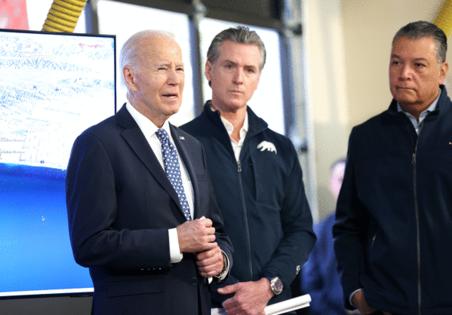GOP Assemblyman Essayli says California Gov. Newsom should call special session for wildfires
Published in News & Features
SACRAMENTO, Calif. — Republican Assemblyman Bill Essayli on Wednesday called on California Gov. Gavin Newsom to convene a special legislative session to overhaul the state’s wildfire response as firefighters battled ongoing blazes in Los Angeles that have claimed five lives and forced over 70,000 people to evacuate.
Newsom declared a state of emergency after the Hurst, Eaton and Palisades fires broke out this week, and appeared in Los Angeles where fire officials briefed him and President Joe Biden on the firefighting efforts. As of Wednesday evening, the Southern California fires had charred more than 26,000 acres as they continued to burn uncontained, according to Cal Fire. Republicans ranging from President-elect Donald Trump to U.S. Rep. Kevin Kiley of California took to social media Wednesday to point the blame at Democratic-led policies.
Essayli, a Republican from Corona, became the latest from the GOP to weigh in, sending a letter to Newsom asking the governor to convene a special session in response to “California’s ongoing wildfire crisis.”
“Homes and business have been lost, insurers are leaving the state, and fire insurance premiums have become unaffordable for many Californians,” Essayli wrote. “Despite these significant wildfires, California has not changed its approach to wildfire prevention policies. As the world’s fifth-largest economy, this is unacceptable.”
Essayli called on Newsom to enact policies like controlled burns and undergrounding of power lines, both of which Newsom’s administration have enacted, supported or considered mandating. The Legislature returned last week for a special session to shore up legal resources for potential litigation with the incoming president.
Earlier Wednesday, Trump falsely blamed the wildfires on Newsom not signing a “water restoration declaration” to preserve water resources.
The Governor’s Office said Trump was conflating Newsom’s support for a controversial Delta tunnel project that would divert water from the Sacramento River to Southern California with local water storage policies, calling the incoming president’s statements “pure fiction.”
While Trump’s statements reignited debate over California’s water management, fire officials maintained that weather conditions and wind patterns were the primary drivers of the blaze. Trump’s history of challenging California’s environmental policies, particularly regarding water allocations to protect endangered species, has often drawn sharp criticism from state leaders and environmentalists.
During its first term, the Trump administration pushed California to increase water pumping from the Sacramento-San Joaquin Delta to support farmers and southern residents. Trump frequently also pointed to forest management as a key factor in California’s wildfire woes. During a visit in 2018 after the devastating Camp fire, Trump famously suggested that California should “rake” its forest floors to prevent wildfires, referencing practices he claimed were used in Finland.
His comments drew widespread criticism from experts, who noted that the majority of California’s forestland is federally managed and that raking forest floors was not a scientifically supported method for wildfire prevention.
Environmentalists and forestry officials say controlled burns and improved infrastructure are more effective ways to address fire risk amid a changing climate. For its part, Cal Fire performed roughly 900 vegetation management projects during the 2023-24 fiscal year ending in June. Better known as controlled burns, the projects proactively burned more than 130,000 acres of state forestland to temper such catastrophic fires. Since July 1, 368 projects have treated 36,740 acres in Cal Fire’s area of responsibility, the agency said.
The U.S. Forest Service has also carried out prescribed fires and fuel reductions across the state, according to federal data. In 2023, the agency’s efforts covered 256,768 acres of federally controlled forestland, including areas of Tahoe, Plumas and Eldorado national forests, according to the California Wildfire and Forest Resilience Task Force.
_____
©2025 The Sacramento Bee. Visit sacbee.com. Distributed by Tribune Content Agency, LLC.







Comments